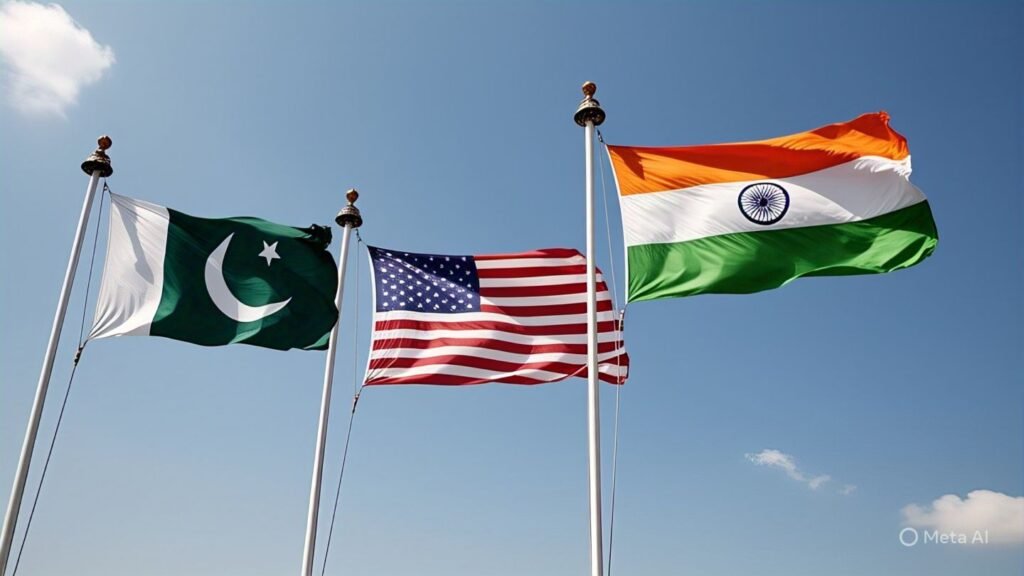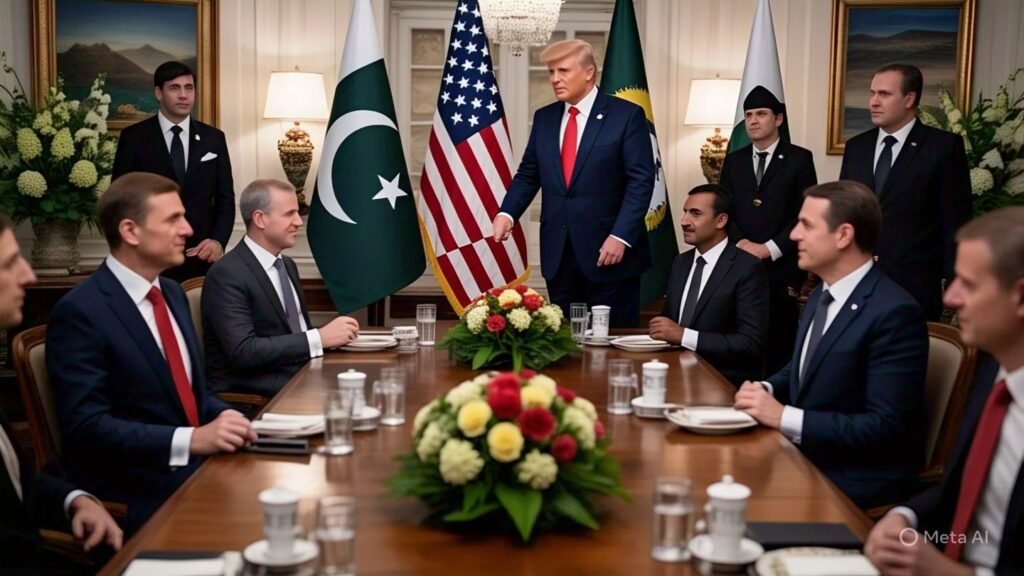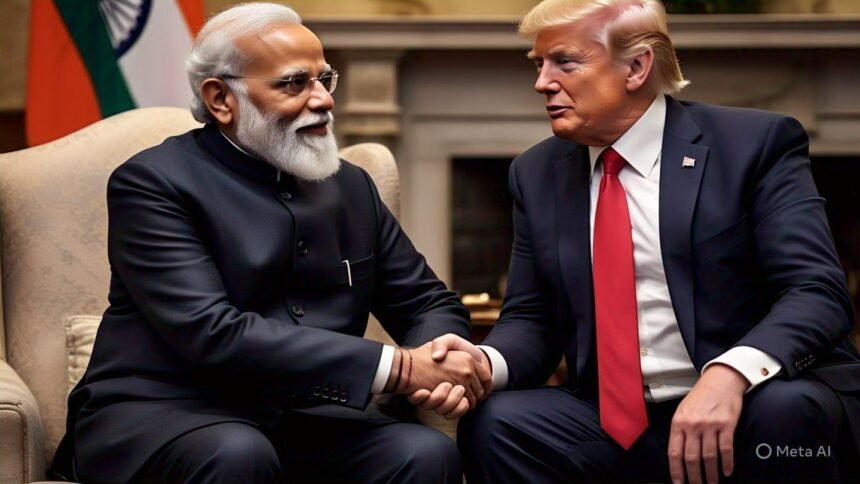Introduction:India-Pakistan leaders agreed to stop conflict
India-Pakistan leaders agreed to stop conflict,In a significant shift from his earlier statements, US President Donald Trump, on Wednesday, acknowledged that the leaders of India and Pakistan themselves made the decision to stop their ongoing conflict. This marks the first time Trump has refrained from taking personal credit for the ceasefire reached between the two nuclear-armed neighbors.
White House Meeting with Pakistan’s Army Chief
President Trump made these remarks after hosting Pakistan’s Chief of Army Staff, General Asim Munir, for lunch at the White House.
Background: The India-Pakistan Ceasefire
India and Pakistan agreed to cease hostilities on May 10, ending a period of heightened military conflict. Since then, President Trump had repeatedly claimed that he had brokered the deal, asserting that his administration played a key role in easing tensions.India-Pakistan leaders agreed to stop conflict, He also hinted at potential trade agreements with both countries, saying America would engage in “a lot of trade” if peace were maintained.

Trump’s New Admission
In his latest remarks, Trump shifted the narrative, stating, “Two very smart people decided not to keep going with that war. That could have been a nuclear war.”India-Pakistan leaders agreed to stop conflict, He praised the leadership of Prime Minister Narendra Modi and Pakistan’s military leadership for choosing peace over conflict.
Trump also thanked General Munir for helping to avoid further escalation and expressed optimism about trade deals being worked on with both India and Pakistan.
Modi’s Stance on Third-Party Mediation
Contrasting with Trump’s previous claims, Indian Prime Minister Narendra Modi has consistently maintained that India will not accept third-party mediation in its disputes with Pakistan.India-Pakistan leaders agreed to stop conflict,India-Pakistan leaders agreed to stop conflict, During a 35-minute phone call with President Trump shortly before the G7 Summit in Canada, Modi reiterated India’s position.
Foreign Secretary Vikram Misri later confirmed that no discussion took place regarding a US-India trade deal or any US proposal to mediate between the two countries during the military operation known as Operation Sindoor. He emphasized that India’s political consensus firmly rejects third-party involvement.

Impact on US-India Relations and Trade Talks
Trump and Modi were scheduled to meet at the G7 Summit, but Trump cut short his trip to Washington amid rising tensions in the Middle East between Israel and Iran. Despite this, the leaders maintained communication, India-Pakistan leaders agreed to stop conflict,with Modi’s call reinforcing India’s firm stance on sovereignty and bilateral conflict resolution.
Trump has expressed enthusiasm about ongoing trade negotiations with both India and Pakistan, viewing improved relations as beneficial to US economic interests.
Conclusion
President Trump’s recent admission highlights the complex dynamics surrounding the India-Pakistan ceasefire. While earlier assertions suggested US mediation was pivotal,India-Pakistan leaders agreed to stop conflict, it is now clear that the primary credit goes to the leaders of India and Pakistan themselves.
India’s firm rejection of third-party mediation and Trump’s recognition of the leaders’ decisions reflect the delicate balance of diplomacy in South Asia. Moving forward, the focus remains on maintaining peace and advancing economic ties between the US, India, and Pakistan.
Positive Aspects
India-Pakistan leaders agreed to stop conflict,
- Acknowledgment of Leadership Decisions: President Trump’s admission that the India and Pakistan leaders themselves decided to end the conflict highlights the agency and diplomatic maturity of both nations, reinforcing their sovereignty in resolving bilateral issues.
- Avoidance of Nuclear Conflict: The ceasefire prevented a potentially catastrophic nuclear war, ensuring regional and global stability.
- Continued Diplomatic Engagement: The White House meeting with Pakistan’s Army Chief signals ongoing diplomatic channels remain open, which is vital for future peace and cooperation in South Asia.
- Trade Opportunities: Trump’s remarks on ongoing trade talks with both India and Pakistan suggest potential economic benefits and stronger bilateral ties in the near future.
- Political Consensus in India: India’s clear stance against third-party mediation demonstrates political unity on foreign policy matters, which can lead to more coherent and consistent diplomatic approaches.
Negative Aspects
India-Pakistan leaders agreed to stop conflict,
- Previous Misattribution of Credit: Trump’s earlier claims of brokering the ceasefire may have undermined the genuine diplomatic efforts of India and Pakistan, potentially straining relations or causing mistrust.
- Limited Role of the US: The admission highlights the limited influence of the US in resolving the conflict, which could be viewed as a setback for American foreign policy objectives in the region.
- Tense Regional Environment: Despite the ceasefire, underlying tensions between India and Pakistan persist, meaning the peace remains fragile and could be disrupted by future incidents.
- Missed Opportunities at the G7 Summit: Trump cutting short his visit to the G7 Summit due to Middle East tensions may have limited deeper bilateral discussions with Modi and other leaders, potentially slowing progress on trade and security cooperation.
- Public Perception and Messaging: Mixed messages regarding the US role in the ceasefire may create confusion or skepticism among the public and international observers about who holds diplomatic influence in South Asia.
